|
|
|
Sort Order |
|
|
|
Items / Page
|
|
|
|
|
|
|
| Srl | Item |
| 1 |
ID:
142966
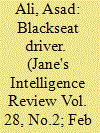

|
|
|
| 2 |
ID:
138885
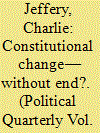

|
|
|
|
|
| Summary/Abstract |
The outcome of the Scottish independence referendum in September 2014 confirmed Scotland's continuing membership of the UK—at least for the time being. It did not take long for some who had campaigned for Scottish independence to begin envisaging a second referendum. Indeed, in early 2015 all the political momentum in Scotland appeared to be with the pro-independence Scottish National Party, which had more than tripled its membership to close to 100,000 since the referendum and had managed a smooth transition from Alex Salmond's leadership to that of Nicola Sturgeon, the new Scottish First Minister. Its main rival in Scotland, the Labour party, found itself in a rather different succession debate, sparked by Johann Lamont's resignation statement complaining about the lack of autonomy given by the party at Westminster to the party in Scotland.
|
|
|
|
|
|
|
|
|
|
|
|
|
|
|
|
| 3 |
ID:
139016
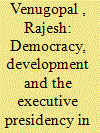

|
|
|
|
|
| Summary/Abstract |
This paper examines the developmental causes and consequences of the shift from a parliamentary to a semi-presidential system in Sri Lanka in 1978, examining its provenance, rationale and unfolding trajectory. Drawing on a wide range of sources, it sets out an argument that the executive presidency was born out of an elite impulse to create a more stable, centralised political structure to resist the welfarist electoral pressures that had taken hold in the post-independence period, and to pursue a market-driven model of economic growth. This strategy succeeded in its early years, 1978–93, when presidents retained legislative control, maintained a strong personal commitment to market reforms and cultivated alternative sources of legitimacy. In the absence of these factors, the presidency slipped into crisis from 1994–2004 as resistance to elite-led projects of state reform mounted and as the president lost control of the legislature. Between 2005–14, the presidency regained its power, but at the cost of abandoning its original rationale and function as a means to recalibrate the elite–mass power relationship to facilitate elite-led reform agendas.
|
|
|
|
|
|
|
|
|
|
|
|
|
|
|
|
| 4 |
ID:
098152
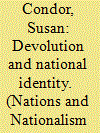

|
|
|
|
|
| Publication |
2010.
|
| Summary/Abstract |
In this article I consider why the expected English backlash to the asymmetric UK devolution settlement has not yet materialised. Using a corpus of conversational interviews, I discuss the various ways in which people in England currently understand the relationship between national identity and political entitlement. I conclude that English political quiescence, far from constituting an enigma, is comprehensible in the light of the fact that members of the general public do not usually base their assessments of political legitimacy on calculations of English national self-interest defined in contrast to Scotland. Rather, political issues tend to be judged with reference to principles of equity and procedural justice. English identity is rarely considered legitimate grounds for political voice. Rather, people are inclined to demonstrate a concern to balance the recognition of Scottish rights to national self-determination, with a display of public reason, civility and civic responsibility understood to be normatively incumbent upon the English majority.
|
|
|
|
|
|
|
|
|
|
|
|
|
|
|
|
| 5 |
ID:
095100
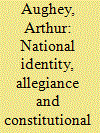

|
|
|
|
|
| Publication |
2010.
|
| Summary/Abstract |
It has become conventional to discuss nationalism in terms of identity. While this approach is fruitful and illuminating, it can often be ambiguous, running together cultural, social, personal and political issues. It becomes particularly problematic when discussing multinationalism, the character of which may be confused by reference to national identity alone. Allegiance is used in this article to explore how a political commitment to the multinational state can coexist with a range of national and regional identities in the United Kingdom. The argument is that, recent constitutional changes notwithstanding, the multinational ideal involves still a state of distinctive national identities tempered by the habit of allegiance to legitimate British government.
|
|
|
|
|
|
|
|
|
|
|
|
|
|
|
|
| 6 |
ID:
127003
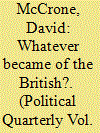

|
|
|
|
|
| Publication |
2013.
|
| Summary/Abstract |
Much of the debate about 'being British' is driven by the politics of the constitutional future of the United Kingdom. This has led to assertions about the declining impact of Britishness, and how, in the interests of the Union, it might be revived. Data from British and Scottish Social Attitudes surveys show that 'Britain' remains an important and meaningful frame of reference, even though people in England and Scotland may not define their prime national identity as British. The relationship between national identity and constitutional preferences is complex. Being 'strongly Scottish' is a weak predictor of constitutional preferences because almost all Scots are at the 'strong' end of the Scottish scale, whereas saying you are 'British' (or not) is a better guide. It is not a matter of choosing to be Scottish or English over being British, but recognising the complexity and inter-relationships of diverse territorial identities.
|
|
|
|
|
|
|
|
|
|
|
|
|
|
|
|
|
|
|
|
|